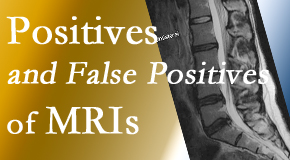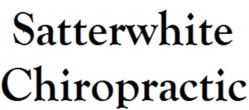MRIs - The Positives and the False Positives
Tests – what are they good for?
When it comes to back pain tests, of MRIs that question must be examined. What are MRIs good for when the percentage of constructive, influential MRI studies is so little? False positive MRI results upset those who get such results. They inspire fear or caution where it is not always warranted. MRIs like this blur the proper treatment plan. They cost quite a bit. Satterwhite Chiropractic carefully weighs the need for MRI in the Oxford chiropractic treatment plan of Oxford back pain relief.
MEDICINE’S VIEW
MRI interpretations by radiologists often vary. The true-positive finding rate was 56.4%, and the miss-rate was 43.6%. (1) MRI imaging may produce misleading suspicion. When following the guidelines of the American College of Radiology, 93% of lumbar spine MRIs were proper. Of those, only 13% revealed anything suspicious. Of the 36 MRIs that raised suspicion of cancer or infection, 81% were false-positive. 59% of the follow-up MRIs on those suspicious findings were false positives. (2) MRI imaging may misinform. For example, MRI demonstrates that the appearance of disc degeneration in asymptomatic persons – persons with no back pain – increases with age: 37% in 20 year olds and 96% in 80 year olds; disc bulges: 30% to 84%; disc protrusion: 29% to 43%; annular fissures 19% to 29%. These imaging findings suggest that these are signs of normal aging. They remind all doctors, remind chiropractors like yours at Satterwhite Chiropractic, to correlate all such findings to patient symptoms. (1,3) Your Oxford chiropractor does this!
CHIROPRACTIC’S VIEW
Choosing Wisely guidelines for American chiropractors suggest30 not repeating spinal imaging and not obtaining spinal imaging for patients with acute low back pain in the first 6 weeks of back pain (except when “red flags” are present– issues that suggest something more sinister). (4) A review of the efficacy of the Canadian Choosing Wisely recommendations for imaging nonspecific spinal pain and symptoms stated that there is very low risk of missing a serious cause of back pain. (5) The purpose of guidelines is less imaging, fewer false positives. Satterwhite Chiropractic wants what is best for our Oxford chiropractic care patients.
COX® TECHNIC’S VIEW
Chiropractors like yours at Satterwhite Chiropractic study all the symptoms, tests and images our Oxford chiropractic back pain patients [[present on|bring with them39] their first Oxford chiropractic visit. So many back pain patients come to Satterwhite Chiropractic with MRI images already done. Satterwhite Chiropractic will study them but will rely more on clinical exam findings and link them to what the MRI reveals. A rule of thumb with the Cox Technic System of Back Pain Relief is to seek 50% decrease of back pain in the first 30 days of care before arranging additional imaging or testing or arranging surgical consultation. (6)
CONTACT Satterwhite Chiropractic
Listen to this PODCAST with Dr. Dan Clark on the Back Doctor’s Podcast with Dr. Michael Johnson as he explains the role of imaging for back pain in the scheme of treatment for pain relief.
Schedule your Oxford chiropractic appointment with Satterwhite Chiropractic today. Let us explore together the best path to Oxford back pain relief – with or without MRI imaging!

